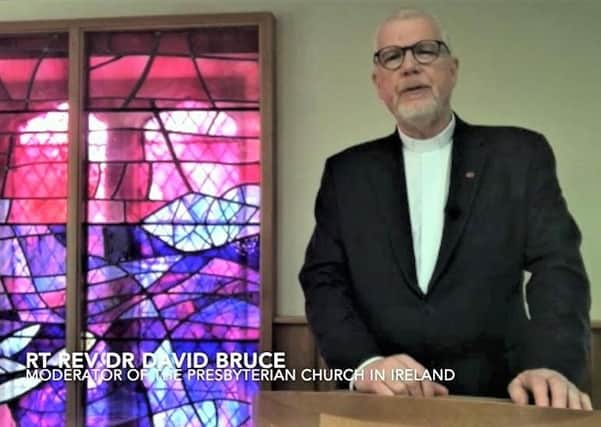‘Hate speech’: The freedom to say only popular things is no freedom at all says top Protestant churchman


Dr David Bruce, the Presbyterian moderator, issued a statement this evening in the wake of Judge Desmond Marrinan’s analysis of the current law in Northern Ireland.
During the period of the review, the Presbyterian Church had voiced deep concern about the growing definition of “hate crime”, asking for guarantees that quoting the Bible will not become a criminal act.
Advertisement
Hide AdAdvertisement
Hide AdCLICK HERE: Hate crime review: Presbyterian Church calls for guarantee that quoting the Bible will not be illegalTonight, Dr Bruce said: “While there is much to digest in his thorough report, we welcome the recommendation that there should be formal statutory recognition of rights guaranteed by the European Convention on Human Rights and Fundamental Freedoms, particularly in relation to freedom of thought, conscience and religion and freedom of expression.
“There must still be space within society to express views with which others may disagree, recognising that this works both ways and allows people to express views about religion with which we may disagree.
“After all, the freedom to only express ideas that are popular is no freedom at all.
“Judge Marrinan notes that the changes he proposes will not ‘be a panacea for all the evils of hate crime speech’.
Advertisement
Hide AdAdvertisement
Hide Ad“Indeed the blunt instrument of the law, nor having an agreed definition of a hate crime is no substitute for the hard and often challenging work of transforming hearts and minds. This is something for which we all have responsibility.”
WHAT DOES THE REPORT CONTAIN?:
Among the many things judge Marrinan also recommended are that “gender” and “gender identity” be protected in law, meaning that people can be prosecuted for conduct carried out against complainants on the basis of those protected categories.
Currently, things like religion and race are already protected categories.
Feminist groups and transgender groups are likely to be pleased with the outcome of the report, having lobbied for greater legal reach to prosecute people for behaviour relating to women and transgender/”non-binary” people.
Advertisement
Hide AdAdvertisement
Hide AdThe phrase “non-binary” is often misinterpreted as “intersex” – that is, people with both male and female sex characteristics.
Instead it refers to people who “identify” as neither male nor female, but who belong to one (or many) of an array of new genders – for instance, the report speaks of a “wider spectrum of gender identities which includes cisgender, transgender and non-binary gender identities”.
The report also says “any new legislation should provide appropriate recognition of the importance of intersectionality”.
Intersectionality is a term associated strongly with race and gender activists.
Advertisement
Hide AdAdvertisement
Hide AdIn short, it means that of someone is a member of two or more minority groups (like gay and Asian) they are doubly disadvantaged.
It has developed into a popular concept, with many adherents advocating for a greater regard for such “intersections”.
But feminist journalist Julie Birchill has been among those to strongly criticise it, saying it reduces every person to an “-ist” and every thought to an “-ism”.
Writing in the Spectator as the movement was gathering pace, she said: “The supreme irony of intersectionality is that it both barracks ‘traditional’ feminists for ignoring the issues of differently-abled and differently-ethnic women, while at the same time telling them they have no right to discuss them because they don’t understand them...
Advertisement
Hide AdAdvertisement
Hide Ad“Entering the crazy world of intersectionality is quite like being locked in a hall of mirrors with a borderline personality disorder coach party: ‘Stop looking at me funny! Why are you ignoring me? Go away, I hate you! Come back, how dare you reject me!’”
Judge Marrinan’s report states: “An oversimplification of victim groups does not necessarily take into account the diverse experiences of victims and the nuances of the harms that they may suffer... intersectionality is an important lens through which we need to understand the nature, dynamics and experiences of some people who are victims of hate crime.”
Read more below:
Click here: Christian pastor: The day dad told me he was a womanClick here: Director of transgender group hired to train PSNI dubbed police ‘racist oppressor pigs who deserve the wall’Click here: Use transgender pronouns or face possible dismissal: new guidelines for NI’s 23,000 civil servantsClick here: Lent is time to reflect on the compassion and courage of Jesus, which perhaps can help us address ‘concerns’ around transgender identityA message from the Editor:
GET 30% OFF SUBSCRIPTIONS UNTIL FRIDAY!
Thank you for reading this story on our website. While I have your attention, I also have an important request to make of you.
Advertisement
Hide AdAdvertisement
Hide AdWith the coronavirus lockdown having a major impact on many of our advertisers — and consequently the revenue we receive — we are more reliant than ever on you taking out a digital subscription.
Subscribe to newsletter.co.uk and enjoy unlimited access to the best Northern Ireland and UK news and information online and on our app. With a digital subscription, you can read more than 5 articles, see fewer ads, enjoy faster load times, and get access to exclusive newsletters and content. Visit https://www.newsletter.co.uk/subscriptions now to sign up.
Our journalism costs money and we rely on advertising, print and digital revenues to help to support them. By supporting us, we are able to support you in providing trusted, fact-checked content for this website.
Alistair Bushe
Editor